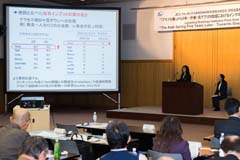Employment and Education Are Key for Stability in the Middle East and North Africa: Results of Joint Research with the Brookings Institution
2015.12.28
"The Arab Spring Five Years Later: Toward Greater Inclusiveness," a compilation of joint research by JICA and the U.S. think tank the Brookings Institution, was recently published.
On the occasion of the release of the report, a seminar to announce the research results was held on Dec. 17 at the JICA Ichigaya Building. JICA-RI research fellows Akira Murata, Yuriko Kameyama and Takako Yuki (currently a senior researcher at Global Link Management, Inc.) participated as contributors to the book.
The event began with Hafez Ghanem, chief researcher of the joint research and vice president for the Middle East and North Africa at the World Bank, presented the results of the research. He explained that "inclusive growth," which allows all the people of that region to share in the benefits of its stability, is essential. He referred to four global common challenges: 1. systemic reforms, 2. invigorating smaller businesses, 3. agricultural development and 4. improving the quality of education. He then emphasized that problems such as terrorism, civil wars and refugees occurring in the Middle Eastern region are not regional problems but global ones the international community must face.

JICA-RI research fellow
Akira Murata
Murata gave a presentation on "A Comparative Study of Job Preferences among Youth in Egypt and Indonesia," arguing the necessity of promoting inclusive growth in employment in Egypt. He pointed out the following three reasons why youth employment is an important issue: First, Egypt is facing a youth bulge, meaning a large percentage of the population consists of young people. Whether the increase in the number of working-age youth can contribute to productive activities in their societies is key for the country to enjoy a demographic bonus. Second, a dynamic demographic transition and a slow economic transformation in Egypt have fostered unemployment. Third, the unemployment rate is high among the youth population in Egypt, especially the highly educated.
In his research, Murata conducted youth job preference surveys for engineering students at ten universities in six cities in Egypt between July and October 2013. For comparative analysis, he carried out the same survey in Indonesia, which has similar characteristics such as a Muslim-majority population, a shift in demographics and youth unemployment issues.
Based on the results of his surveys, Murata reported that while young people tend to prefer to become public employees because of higher wages, narrowing the salary gap between the public sector and private sector would increase interest in the private sector. This works more efficiently for males. Even in the case of continued high public sector wages, policies for the private sector such as educational support, improvement in the IT infrastructure and aid in medical insurance could significantly contribute to an increase in the rates of private sector employment among young Egyptian job seekers.
Kameyama and Yuki together gave a presentation on "Improving the Quality of Basic Education for the Future Youth of Yemen Post Arab Spring." Yemen's education level is the lowest among Middle Eastern countries that participated in Trends in International Mathematics and Science Study (TIMSS) for fourth-graders in 2011. Also, its overall score in other international academic assessments also was low among mid- to low-income countries, including some in Africa. Further, with an increase in the school enrollment rate in recent years, the student-to-teacher ratio has increased by 1.5 times, which causes concerns about the quality of education.

JICA-RI research fellows Yuriko Kameyama
and Takako Yuki give presentations
To improve academic achievement, it will be essential to make effective use of databases on Yemen's educational system, school management, policy reforms, academic results and human resource management. Although the momentum for educational reform was temporarily interrupted by the 2015 civil war in Yemen, the Ministry of Education has begun working toward restarting the formulation of a mid- to long-term strategic education plan. In their presentation, the two said they want to voice the need to take comprehensive measures on the systemic level, school level and community level to improve academic results and to strengthen accountability.
Ghanem, who gave the closing address, pointed out as major problems in education insufficient learning time and quality issues including governance and the quality of teachers. At the same time, he emphasized the need to solve educational problems without leaving them to the next generation.
He closed the seminar by saying, "Education is an important issue not just for economic development, but also when thinking about peace, stability and the role of women in the society. It will be important to apply these research results to future projects."

事業事前評価表(地球規模課題対応国際科学技術協力(SATREPS)).国際協力機構 地球環境部 . 防災第一チーム. 1.案件名.国 名: フィリピン共和国.

事業事前評価表(地球規模課題対応国際科学技術協力(SATREPS)).国際協力機構 地球環境部 . 防災第一チーム. 1.案件名.国 名: フィリピン共和国.

事業事前評価表(地球規模課題対応国際科学技術協力(SATREPS)).国際協力機構 地球環境部 . 防災第一チーム. 1.案件名.国 名: フィリピン共和国.

事業事前評価表(地球規模課題対応国際科学技術協力(SATREPS)).国際協力機構 地球環境部 . 防災第一チーム. 1.案件名.国 名: フィリピン共和国.

事業事前評価表(地球規模課題対応国際科学技術協力(SATREPS)).国際協力機構 地球環境部 . 防災第一チーム. 1.案件名.国 名: フィリピン共和国.
scroll